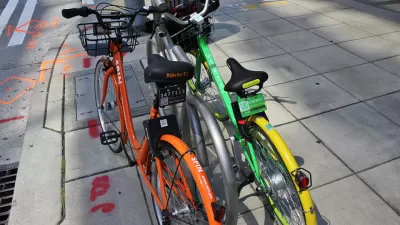After missing out on the latest round of TIGER grants and being stuck in acquisition limbo with the city of Seattle, the bikeshare system of Pronto is running out of money and time.
Josh Cohen delivers dark news for Seattle's bikeshare program, Pronto:
Seattle’s bike-share system is in dire straits. After a little over a year of operations, Pronto turned to the Seattle City Council for a $1.4 million bailout. Without it, the system will be insolvent by the end of March and the city might be required to pay back more than $1 million in federal grants.
Nicole Freedman, the director of active transportation for the Seattle Department of Transportation (SDOT), recently attended a City Council committee meeting recently to ask for the release of "$1.4 million of the $5 million in the 2016 city budget allotted for bike-share expansion." That expansion, billed in October as a significant public investment in the Pronto system, was delayed, "pending a fleshed-out plan for the expansion," according to Cohen. Pronto also failed to win a $10 million TIGER grant that would have contributed to the expansion.
The requested $1.4 million would help SDOT to take ownership of Pronto. Some councilmembers are concerned about the city taking over ownership of what is clearly a troubled operation.
In an earlier story, Evan Bush detailed the debate about how Pronto got into this position. While some say the bikeshare program failed to raise sufficient funds before launching, Pronto officials respond that the city's delayed acquisition process is responsible for the current state of the system's finances.
FULL STORY: Seattle’s Pronto bike-share nonprofit teetering, seeks $1.4M rescue by city

Alabama: Trump Terminates Settlements for Black Communities Harmed By Raw Sewage
Trump deemed the landmark civil rights agreement “illegal DEI and environmental justice policy.”

Planetizen Federal Action Tracker
A weekly monitor of how Trump’s orders and actions are impacting planners and planning in America.

The 120 Year Old Tiny Home Villages That Sheltered San Francisco’s Earthquake Refugees
More than a century ago, San Francisco mobilized to house thousands of residents displaced by the 1906 earthquake. Could their strategy offer a model for the present?

In Both Crashes and Crime, Public Transportation is Far Safer than Driving
Contrary to popular assumptions, public transportation has far lower crash and crime rates than automobile travel. For safer communities, improve and encourage transit travel.

Report: Zoning Reforms Should Complement Nashville’s Ambitious Transit Plan
Without reform, restrictive zoning codes will limit the impact of the city’s planned transit expansion and could exclude some of the residents who depend on transit the most.

Judge Orders Release of Frozen IRA, IIJA Funding
The decision is a victory for environmental groups who charged that freezing funds for critical infrastructure and disaster response programs caused “real and irreparable harm” to communities.
Urban Design for Planners 1: Software Tools
This six-course series explores essential urban design concepts using open source software and equips planners with the tools they need to participate fully in the urban design process.
Planning for Universal Design
Learn the tools for implementing Universal Design in planning regulations.
Clanton & Associates, Inc.
Jessamine County Fiscal Court
Institute for Housing and Urban Development Studies (IHS)
City of Grandview
Harvard GSD Executive Education
Toledo-Lucas County Plan Commissions
Salt Lake City
NYU Wagner Graduate School of Public Service



























